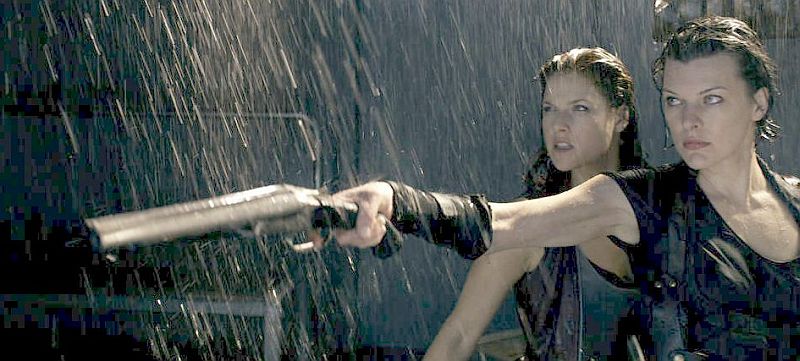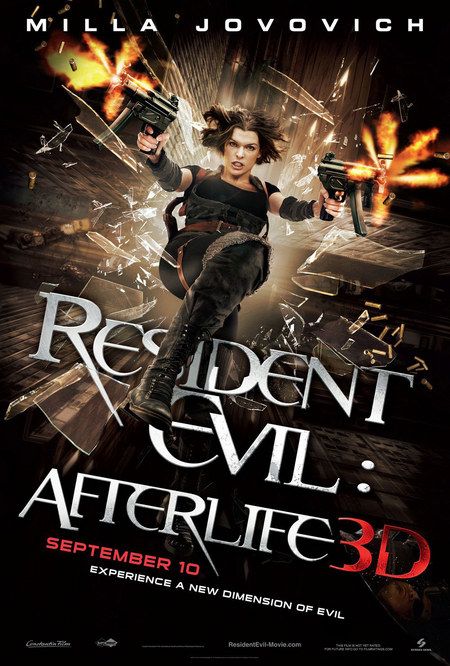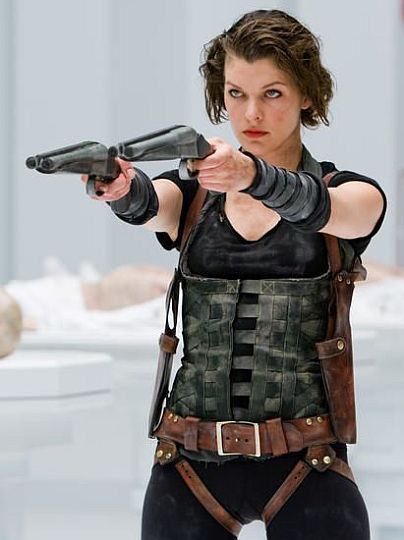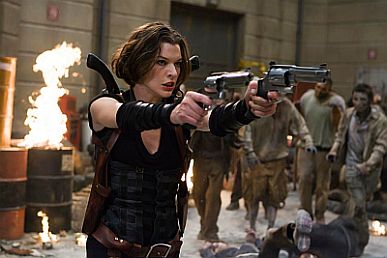
★★★
“Is There Life After Afterlife?”
 Milla Jovovich, coming at you in three dimensions! Unfortunately, Chris and 3D movies do not play well with each other – as we discovered at Avatar, where the resulting motion sickness had her staring at the back of the seat in front, after the first twenty minutes. She understandably declined all invitations to see Afterlife in this mode, so please note that with regard to this review, we’re strictly discussing the 2-D version. Other reports generally indicate the 3-D is pretty spiffy, having actually been shot that way, rather than being some hacked conversion job like certain movies I could mention [cough-ClashoftheTitans-cough]. That said, we move on.
Milla Jovovich, coming at you in three dimensions! Unfortunately, Chris and 3D movies do not play well with each other – as we discovered at Avatar, where the resulting motion sickness had her staring at the back of the seat in front, after the first twenty minutes. She understandably declined all invitations to see Afterlife in this mode, so please note that with regard to this review, we’re strictly discussing the 2-D version. Other reports generally indicate the 3-D is pretty spiffy, having actually been shot that way, rather than being some hacked conversion job like certain movies I could mention [cough-ClashoftheTitans-cough]. That said, we move on.
We keep bumping into the first Resident Evil movie, which has been on cable a lot lately, and I’m tending to think my 3 1/2-star review was an under-estimate. Maybe due to the underwhelming nature of the last couple of entries in the series, the original moves briskly, keeps a tight focus on proceedings, and has a nice character arc for Alice. I was hoping that the return of its creator, Paul W.S. Anderson, to writing and directing for this fourth installment would signal a return to this approach.
There’s really only one reason we bother with this series: to see Milla Jovovich kicking righteous ass. Everything else is – or should be – secondary. And for the first 15 minutes, it looked like this would indeed be a return to these basics, as Alice and an army of Alice-clones launched a righteous assault on the massive complex housing the Umbrella Corporation’s headquarters beneath Tokyo. It’s reminiscent of the lobby scene from The Matrix, with a swarm of Alice-alikes breaking in and hurling themselves against the guards like aggrieved lemmings, with no regard for their personal safety, as they try to take out Umbrella’s CEO’s Albert Wesker (Roberts).
It’s great: among the best scenes of the entire series, in fact. The bad news is, it’s also the best thing in the movie. The sequence would have made a great climax, but instead, everything thereafter feels like an anti-climax. Wesker escapes by helicopter, flipping the self-destruct switch and destroying the clones. However, the real Alice is aboard, and before the ‘copter crashes, he injects her with a serum that neutralizes the T-virus, rendering her human again. Boooooo-ring! Turns out they both survive the crash: quite why Wesker didn’t deal with her then, isn’t made clear. Alice heads to Alaska, in search of the haven called Arcadia where Claire Redfield (Larter) was heading at the end of the third film.
 That turns out to be a red herring, but Alice does find Claire, albeit now controlled by an Umbrella device on her chest. Removing that, albeit at the cost of Claire’s memory, the pair fly back down the West coast, eventually locating a group of survivors bunkered down in an LA prison – Arcadia turns out to be the name of a boat, anchored just offshore. As the zombies break in, the survivors make their way towards the boat, with the help of a prisoner who turns out to be Chris (Miller), Claire’s brother. Reaching the Arcadia, they discover it’s a trap, designed to lure people to it for Umbrella’s research, with Wesker overseeing operations. He wants to assimilate (or “eat”) Alice; as the only person to successfully meld with the T-virus, he wants that ability to enhance his own superpowers.
That turns out to be a red herring, but Alice does find Claire, albeit now controlled by an Umbrella device on her chest. Removing that, albeit at the cost of Claire’s memory, the pair fly back down the West coast, eventually locating a group of survivors bunkered down in an LA prison – Arcadia turns out to be the name of a boat, anchored just offshore. As the zombies break in, the survivors make their way towards the boat, with the help of a prisoner who turns out to be Chris (Miller), Claire’s brother. Reaching the Arcadia, they discover it’s a trap, designed to lure people to it for Umbrella’s research, with Wesker overseeing operations. He wants to assimilate (or “eat”) Alice; as the only person to successfully meld with the T-virus, he wants that ability to enhance his own superpowers.
There’s way too much moving about in underground darkness here, and elements are lobbed in from the video game, which make no sense in the context of the movie. For instance, some zombies now have their faces split open and become all tenticular: why, is never explained, and the CGI used here is less effective than the effects used for a similar concept in Blade II, almost a decade ago. There’s also the Executioner, a giant creature wielding an even-larger weapon: again, its presence from a cinematic perspective is completely unexplained. In short, the film just doesn’t make much sense, though admittedly, between the battles, there was precious little of interest going on to hold my attention.
Nor is there much feeling of threat to the characters, who cheat death with blithe abandon – the sense of “anyone can die, at any time” present in the original is all but gone. A case in point would be the leader of the survivors, who vanished from the film entirely as they make their way out of the prison, only to reappear, right at the end, to no point whatsoever. Chris Redfield is an almost entirely superfluous character; like the monsters mentioned above, he is apparently there, just so that fans of the game can go “Look! It’s Chris Redfield!” The rest of us…not so much. The whole subplot of Alice’s humanity being restored doesn’t go anywhere either; that may well be fortunate. In any case, by the end, she seems completely back to normal. Well, “normal” in the way we want to see, anyway.
 Which brings me nicely to the action, and it is, as usual for the series, solid, meaning this is, overall, just worth the 92 minutes of your time it will take up. I think due to the 3-D, the editing is more restrained than it has been of late; indeed, there’s probably as much slow-motion as anything else. I particularly liked Alice’s fondness for loading her shotgun with coins – again, I suspect largely for 3-D purposes. There’s a nice tag-match between her, Claire and the Executioner, but the final face-off versus Wesker is largely forgettable. As usual, the film ends on an interesting note: this time, it’s the return of a character last seen in Apocalypse, who makes a cameo early in the end-credits, and I wouldn’t mind seeing them return.
Which brings me nicely to the action, and it is, as usual for the series, solid, meaning this is, overall, just worth the 92 minutes of your time it will take up. I think due to the 3-D, the editing is more restrained than it has been of late; indeed, there’s probably as much slow-motion as anything else. I particularly liked Alice’s fondness for loading her shotgun with coins – again, I suspect largely for 3-D purposes. There’s a nice tag-match between her, Claire and the Executioner, but the final face-off versus Wesker is largely forgettable. As usual, the film ends on an interesting note: this time, it’s the return of a character last seen in Apocalypse, who makes a cameo early in the end-credits, and I wouldn’t mind seeing them return.
Despite the 3-D, the movie was only a mediocre success here, but a much greater hit overseas. For perspective, the percentage of total box-office coming outside North America for the first three entries was fairly constant, at 61%, 60% and 66% respectively. Afterlife got an astonishing 80% of its takings in foreign territories, grossing $236 million there, compared to only $60m in the US, barely recovering its budget. That’s one of the highest ratios of the year, and has only been surpassed a handful of times this decade, by films with a broad Stateside release. It’s this success abroad which means a fifth installment is all but certain. And as long as they keep making them, we’ll keep watching, hoping the potential, seen in flashes, might be more fully realized. A script which makes sense on its own terms, and doesn’t bother pandering to gamers, would be a good start.
Dir: Paul W.S. Anderson
Stars: Milla Jovovich, Ali Larter, Wentworth Miller, Shawn Roberts






















